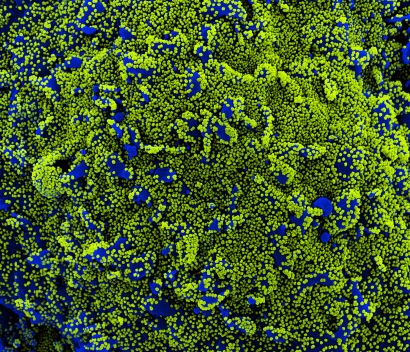- About
- Organization
- Organization Overview
- Dean’s Office
- Department of Bioengineering and Therapeutic Sciences
- Department of Clinical Pharmacy
- Department of Pharmaceutical Chemistry
- Quantitative Biosciences Institute
- Org Chart
- Research
- Education
- Patient Care
- People
- News
- Events
QBI continues research efforts to stave off future surges of COVID-19
Studies shed light on viral variants and the effectiveness of potential disease therapies
By Levi Gadye / Wed Jun 30, 2021

A cell (blue) heavily infected with SARS-CoV-2 virus particles (green), isolated from a patient sample.
While businesses and schools reopen across the U.S. thanks to the domestic waning of the COVID-19 pandemic, the virus responsible for the disease, SARS-CoV-2, continues to spread globally.
Scientists in the UCSF Quantitative Biosciences Institute (QBI)8, an organized research unit in the UCSF School of Pharmacy, remain laser focused on this ongoing threat. In findings published in the last month, two research groups brought together by QBI have uncovered new details about the highly transmissible Alpha variant of SARS-CoV-2 and a large group of drugs once suspected to be effective in treating COVID-19—work that is crucial for fending off future disease surges.
Alpha variant skirts immune detection to spread rapidly
In the first study, published in bioRxiv on June 7, researchers from QBI and University College, London identified how the Alpha (B.1.1.7) variant of the SARS-CoV-2 virus evades the human immune system9 by blocking the release of a human “alarm” molecule known as interferon, preventing the activation of the innate immune system.
This avoidance of one type of immune detection allows the Alpha variant to proliferate uninhibited in the body longer than earlier variants of SARS-CoV-2, increasing the chances of both severe disease and transmission to other people.
“Identifying this key pathway and proteins responsible for this variant’s increased infectiousness points us to potential drug targets,” senior author and QBI Director Nevan Krogan, PhD10, told UCSF News. “That knowledge has important implications for management of the ongoing pandemic.”
More
Mutation in Highly Infectious Alpha Variant May Help Coronavirus Evade Immune System (UCSF News)11
How the ‘Alpha’ Coronavirus Variant Became So Powerful (The New York Times)12
COVID drug candidates miss the mark as viable therapies
The second study, published in Science on June 22, took a closer look at dozens of drugs that were identified in 2020 as potential therapies for COVID-19. The team of researchers, hailing from QBI, the Institut Pasteur in Paris, and the pharmaceutical company Novartis, found that none of these drugs would actually work as treatments for SARS-CoV-213. Instead, these drugs all cause a phenomenon called phospholipidosis in human cells, damaging parts of these cells that the virus relies on to replicate.
In other words, these drugs only fight the virus by means of toxicity to human cells, rendering their antiviral, therapeutic properties moot.
“With any drug discovery approach, scientists need to stay aware of the general effects of chemical compounds on the biology of cells, which can lend false hope to ineffective drugs,” said Brian Shoichet, PhD14, senior author on the study, member of QBI, and faculty member in the School’s Department of Pharmaceutical Chemistry. “Our work should enable future studies to account for this issue and home in on truly effective treatments.”
More
Tags
Keywords:
Category:
Research20
Sites:
School of Pharmacy, Department of Pharmaceutical Chemistry, PharmD Degree Program
About the School: The UCSF School of Pharmacy aims to solve the most pressing health care problems and strives to ensure that each patient receives the safest, most effective treatments. Our discoveries seed the development of novel therapies, and our researchers consistently lead the nation in NIH funding. The School’s doctor of pharmacy (PharmD) degree program, with its unique emphasis on scientific thinking, prepares students to be critical thinkers and leaders in their field.



